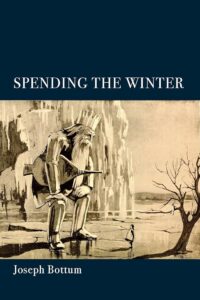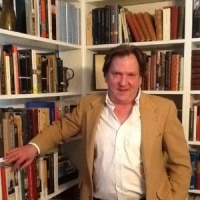Joseph Bottum writes strikingly beautiful poetry
I found a perfect, if personal, antidote for the discomfort of sitting in a crammed airplane seat for an eight-hour overseas flight. And that’s to bring along a book of poetry recommended by a friend, and to be be enraptured by the beautiful poems it contained.
Joseph Bottum is an essayist, critic, fiction writer, scholar, editor, and apparent master of what’s known as the Amazon Single, a short story or essay published as a standalone work (his “Dakota Christmas” reached #1 on the Amazon e-book bestseller list). He’s also a poet, with several published works, including Spending the Winter (2022), which the friend recommended and which I read on my overseas flight.
I was dazzled by the sheer beauty of the poems. Bottum is a New Formalist, but the poems in this work aren’t limited to that. No matter. Whether you’re reading a poem with measured meter and rhyme or free verse, you’re hearing music and seeing beauty while you read. (I used my in-flight headphones to block out the plane noise.)
Bottum writes of Easter morning, and when roses are in bloom (and still are); he prays as an ascetic and watches the doves; he reads William Blake and describes a London frost fair when the Thames froze over; he has a bit of fun as he “reads by osmosis” or finds inspiration in Robert Browning when he writes about his last Dutch oven, of all things (poets can be closet comedians). He writes a graduation poem about the four seasons, and he describes how he spends the winter; the title poem is a three-page feast of images.
And he describes a child’s memory, under the table where the grownups are gathered, and how in his imagination he will launch himself into flight, initially protected by that table.
My Grandfather’s Table

Was weighty and solid, sure of its place:
A walnut cave from which, little mouse,
To watch the serious measured pace
Of all the big ones passing by,
The step of each grave, polished shoe,
And I would dream that I could fly—
Above their heads, beyond all view.
Slipping out past the windowsill,
I’d brush the leaves of the backyard tree,
Skimming the cemetery’s hill
To reach clean air, unearthed and free.
Like great-winged hawks, grandfather and I
Would break away—and then we’d know
How to rise in the sunlit sky,
Not sink in shadows, down below.

Joseph Bottum
Bottum’s published works include memoirs, short stories, literary criticism, essays, and sociological studies. One of his best-known works is The Anxious Age: The Post-Protestant Ethic and the Spirit of America. He’s worked as an editor, contributing editor, and writer for several publications, and his writing has appeared in such publications as The Wall Street Journal, The Times of London, Newsweek, Commonweal, The Atlantic, and The Weekly Standard. With author and poet Sally Thomas, he produces the Poems Ancient and Modern blog on Substack. He’s been a Distinguished Visiting Professor at Houston Baptist University and is currently the director of the Collaborations for Liberty and Security Strategies for Integrity in a Cyber-enabled Society (CLASSICS) Institute at Dakota State University, where he’s focused on cyber-ethics.
And he writes beautiful poetry, the kind that stays with you long after you’re finished reading (and the plane has landed).
Photo by Martin Fisch, Creative Commons, via Flickr. Post by Glynn Young.
How to Read a Poem uses images like the mouse, the hive, the switch (from the Billy Collins poem)—to guide readers into new ways of understanding poems. Anthology included.
“I require all our incoming poetry students—in the MFA I direct—to buy and read this book.”
—Jeanetta Calhoun Mish
- Longfellow’s “Paul Revere’s Ride”: Creating a National Legend - April 17, 2025
- Poets and Poems: Katie Kalisz and “Flu Season” - April 15, 2025
- Poets and Poems: Michelle Ortega and “When You Ask Me, Why Paris?” - April 10, 2025


Leave a Reply